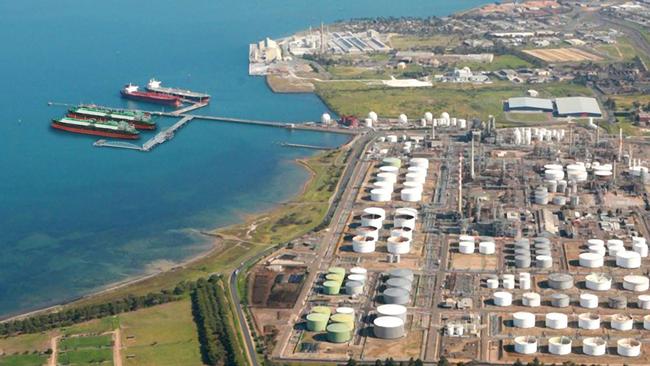Viva suffers power outage at refinery and restart could take weeks, company reveals
The outage has seen the energy player take a hit before it learns the fate of a proposed project which could help with the looming gas shortfall.
Viva Energy’s Geelong refinery – a major source of revenue for the company – has suffered a power outage, and it could take up to a fortnight to fully restart operations.
The outage on Sunday was caused by lightning strikes in the neighbouring area that caused temporary loss of power, the company said. While power has since been restored, resuming full capacity at the refinery would take at least a week and up to two.
Viva will use stockpiled oil to meet market orders, and could increase imports or enter into swaps.
It comes before the last round of public hearings about Viva Energy’s proposed LNG (liquefied natural gas) import terminal, to be held this week. Authorities will soon announce whether the project – a bid to prevent a catastrophic gas shortfall – has been approved.
Viva has proposed extending a pier at the Geelong refinery to moor a vessel capable of carrying LNG, which could be used to supply Victorian homes and businesses during peak-demand periods.
The proposal is, however, controversial and opposed by some influential groups, most notably the powerful private school Geelong Grammar.
However, Victoria is increasingly likely to run low on gas, perhaps as soon as this winter.
The precarious situation has seen Victoria’s Labor government tweak policies in order to prevent supply disruptions.
Victorian Premier Jacinta Allan late last year said her government would fast-track new gas extraction, storage and transmission projects alongside renewable projects to “ensure reliable access to gas for Victorian businesses”.

In what shapes as the first test case of Victoria’s attitude towards gas, The Australian understands a decision could be announced by the end of March.
Australia’s energy industry has urged state and federal governments to accelerate approvals on bolstering supplies to mitigate the economically devastating impact of a gas shortfall.
But opposition from environmentalists and other groups continues to sway governments, which have appeared unwilling to grant potentially unpopular approvals even as they privately acknowledge the dangers of a gas shortfall.
The Australian Competition & Consumer Commission last week conceded the country’s east coast would soon be reliant on importing LNG cargoes as supplies from traditional sources begin to deplete, which could put upward pressure on prices.
Importing LNG would require more expensive transport, even if spot cargoes can be sourced from domestic exporters in Queensland. Proponents of LNG import terminals, however, insist global expansion will soon create an oversupply of LNG, which will offset the higher transport costs, when compared to traditional piped supplies.
However, many analysts say a global gut of LNG is probably several years away, at the earliest.
Australia’s Energy Market Operator has warned a shortfall of gas could emerge by winter 2026 and almost definitely by 2028 as supplies from the Bass Strait, the traditional dominant supplier to the region, begin to run down.
Victoria is particularly exposed as Australia’s most gas-dependent state, with households using the fuel source for heating during winter, while its large manufacturing sector is dependent on gas to continue operations.
A gas shortfall, even if only brief, would have a material impact on all of Australia’s National Electricity Market.
Gas is used as a ‘‘peaker’’: Gas power stations can run for short periods of time when there is increased demand for electricity or diminished supplies from renewables.
Shortfalls of gas would mean wholesale electricity prices spike when conditions are unsuitable for renewable energy generation. Households and businesses do not pay wholesale electricity prices, but they drive future tariffs. A gas supply crunch would also limit the scope for coal power stations to be shut down as authorities warn they can only allow for the power source to be closed when there is reliable alternative supply.
Still, gas remains unpopular, with environmentalists insisting it will delay the energy transition, a stance that won significant support during the 2022 election when the Greens captured a record vote.




To join the conversation, please log in. Don't have an account? Register
Join the conversation, you are commenting as Logout